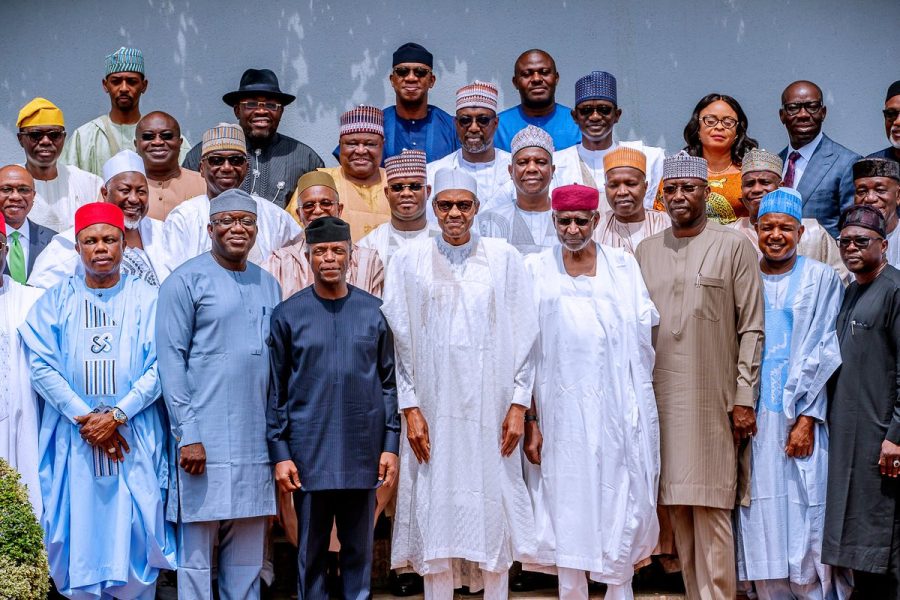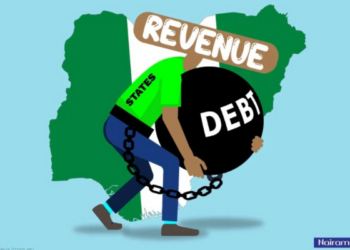While Nigeria’s debt profile hits a new high of N24.9 trillion in March 2019, state governors have parted with the sum of N33.9 billion referred to as external debt deductions in just one year. This is reflected in the analysis of reports of revenue disbursement to states by the Federation Account Allocation Committee (FAAC).
Analysis of the data obtained from the National Bureau of Statistics (NBS) reveals that the sum of N33.9 billion was deducted from monthly allocation entitled to states between June 2018 and May 2019. This is believed to be deductions in the form of loan servicing obtained from external sources.
[READ MORE: How State Governments will become richer without FAAC allocation]
Number breakdown: Across the 36 States of the Federation, unsurprisingly, Lagos State parted with the biggest amount from its allocation. Specifically, the sum of N10.3 billion was deducted from the allocation due to the State. This is largely expected as the State’s domestic debt stock is the biggest of all, rising to N542 billion in March 2019.
- Kaduna State ranks third, with the sum of N2.28 billion deducted, leaving the State with an estimated N93 billion debt profile.
- Cross River follows Kaduna slowly, having repaid N2.1 billion debt in the last one year, with N167 billion debt stock.
- Oyo, Rivers, Osun and Katsina all repaid above N1 billion each within the period.

Recent developments: Last week, the Debt Management Office (DMO) released the country’s debt stock data, and the report shows that only domestics debts accruing to States Governments rose to N3.97 trillion in March 2019. On the other hand, a proportion of the total N7.8 trillion total external debt is still accruable to the states.
- Recent reports on FAAC disbursement have revealed some worrying trends, as revenue allocation declined by N1.3 billion in May 2019.
- In April, a total of N617.5 billion was disbursed, while the disbursement dropped to N616.2 billion in May 2019.
- This means that while states’ allocations are depleting, a portion of their monthly allocation is still constantly bookmarked to service debt.
[READ ALSO: Nigeria’s total debt stock rises to N24.9 trillion]
Debt management: Specifically, loans or debt granted to countries and states come with terms or conditions which may include cash to cover repayment of interest and principal on a debt for a particular period.
- Debt can be flexible or otherwise, with a wide choice of financial conditions that are specifically tailored to meet a country’s overall debt management strategy.
- Nigeria’s debt category is largely dominated by 41% of multilateral and bilateral sources from the World Bank, Bank of China, the African Development Bank and so on.
- In order to manage the debt, billions are periodically substracted from both States and the Federal Government in the form of debt servicing being collected.
- As of March 2019, the Federal Government paid N719 billion to service both external and domestic debt.
Bottom line: Debt is not entirely bad, as developing nations sometimes need a big push to meet financial obligations, but state governments need to be wary of building the country’s overall debt stock.
- Another critical downside to billions being parted by states to service debt is that these monies are being surcharged from already depleted revenue.
- With most states running on low internally-generated revenue, there appears to be no concrete plan to manage the rising debt stock across the states.
- In an attempt to deliver promises made to their citizens, many state governors may already be considering other debts accumulation strategies and this calls for great concern.
[READ FURTHER: Accountant General says no problem paying N293 billion debt servicing]















.gif)






